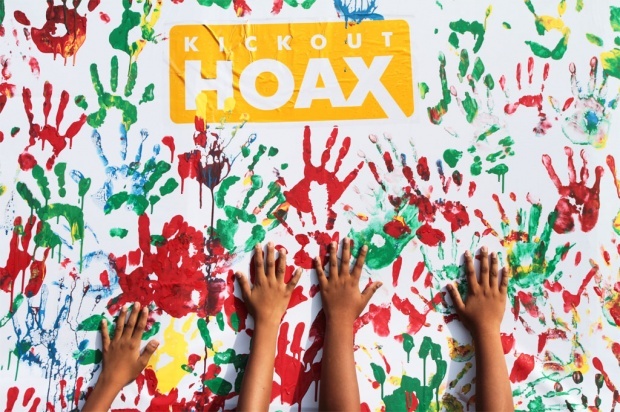In an attempt to stop the rampant circulation of hoaxes on the Internet and several social media platforms, an anti-hoax campaign was kicked off across six cities in Indonesia last week.
Various groups were urged to conduct such movement with the proliferation of fake news becoming a serious problem in the country. The campaign, called #TurnBackHoax, was launched by the Anti-Hoax Society of Indonesia.
Indonesian Anti-Hoax Society Head and Campaign Organizer Septiaji Eko Nugroho said that the spread of false information online is alarming and has the potential to threat national security. Nugroho also shared that the inspiration behind the campaign was “rooted from our concern of broken friendships, conflicts in which have been triggered by a few people we know who believe in hoaxes.”
A ‘KickOutHoax’ wall was put up in Solo, Central Java, so that its residents could stamp their hands on it and express their support. While Anti Hoax Society volunteers in Surabaya, East Java, taught its residents ways to identify false information online.
“The role of the society is very important in this effort,” said Communications and Information Technology Minister Rudiantara as quoted by reporters. He also told the hundreds of participants and the public to be cautious of the information they see on social media by verifying them and resisting the urge to share fake news.
Titi Anggraini, executive director of the Association for Elections and Democracy, pointed out that “hoax news has been a daily phenomenon in Indonesia.” The government has been taking on drastic measures to contain the spread of public misinformation with the Ministry of Communication and Informatics blocking 11 sites last December 2016. They also plan on inaugurating a national cyber agency within this month.
See: Government Blocks Unreliable News Portals, Sets Up Cyber Agency
Anggraini told TIME that such actions are “important to make things right and to teach a lesson” to offenders. She also added that “the legal process, especially criminal punishment, is really ultimum remidium [the last resort]” and calls for digital literacy education.
Catholics in Indonesia have also showed their support to the anti-hoax campaign. Joannes Joko, secretary-general of the Association of Catholic Graduates and Intellectuals in Indonesia, said, “the current situation is very dangerous. A lot of false information is circulated.” He added that people need to know that the information they see on the Internet is accurate and has already been verified.
The Indonesian Press Council plans to give barcodes to verified media outlets so that it’ll be easier for the public to distinguish legitimate news sites from the unreliable ones. When readers scan the barcodes, they will be redirected to the council’s database.
Teguh Prasetya, strategic policy chief at the Indonesian Telematics Society, also encouraged the government to put a pop-up warning display on suspicious websites.
Rudiantara said that the ministry will promote its so-called ‘white list’ containing more than 100,000 websites that the public and educational institutions are encouraged to access.




